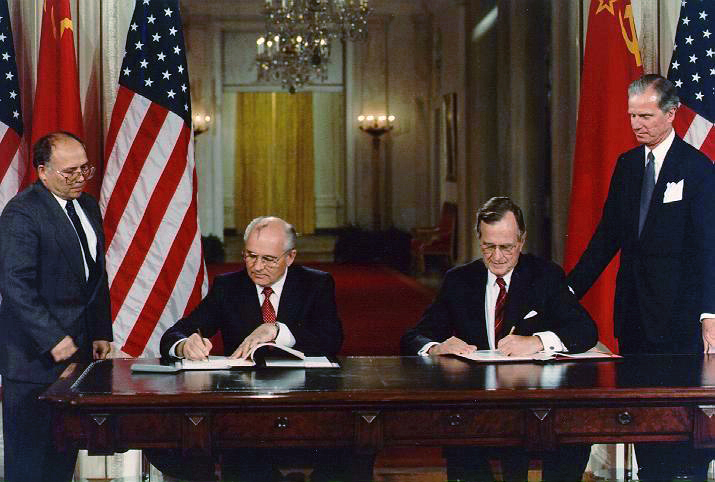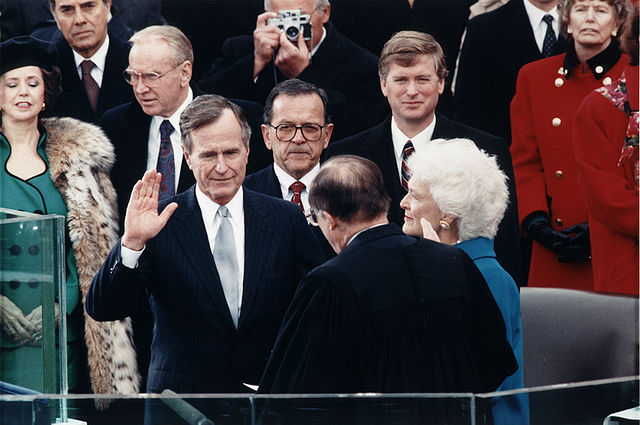The prevailing view was that [German] reunification was a distant dream, and key leaders in Europe did not support a unified Germany. Despite these obstacles, President Bush worked behind the scenes in support of a grassroots movement that led to unification in a way that established a major ally in Europe at peace with its neighbors and a bulwark against totalitarian aggression. Significantly, President Bush was able to advance German unification without alienating key Soviet leaders as they struggled to navigate major transformation in the U.S.S.R. and its empire.
Dr. Hyun Jin Preston Moon
Unified Korea: Strategic Framework for Resolving the Korean Peninsula Issue
December 12, 2018
Honoring Bush 41 and his role in German Reunification: Some lessons for Korea

Service members of the joint forces honor guard provide military honors during the arrival of former President George H. W. Bush. (Photo Credit: Staff Sgt. Daniel J. Martinez)
Earlier this month the U.S. and much of the world mourned the passing of former president George H.W. Bush – Bush 41 as he is popularly known. During his presidency, he guided the U.S. and the world through momentous historic changes with wisdom, foresight, and a steady hand. As former president Obama said of him, “when democratic revolutions bloomed across Eastern Europe, it was his steady, diplomatic hand that made possible an achievement once thought anything but – ending the Cold War without firing a shot.”
German Chancellor Angela Merkel, who was born in an East Germany that was still part of the Soviet Bloc, said at the recent G20 Summit in Buenos Aires that she “probably couldn’t be standing here” if it were not for Bush’s role.
German reunification as the Cold War ended was by no means guaranteed. The prevailing view among Germans had been that reunification was a distant dream. When growing numbers of East Germans started to vote with their feet, ideas changed but elsewhere in Europe leaders like Margaret Thatcher and Francois Mitterand did not support a unified Germany.
Yet Bush did and so worked with the German chancellor Helmut Kohl to bring it about in a way that saw it wedded to the values and institutions of the Western liberal democracies, removing the Soviet influence of the past.
At the same time, he sought to use diplomatic persuasion to get Soviet leader Gorbachev to accept this change, always conscious of the reactionary opposition in Moscow that wanted to re-impose Soviet control throughout Eastern Europe. Bush supported Gorbachev in his reforms and never used “we are the victors” rhetoric against him in pursuing the goal of a Western-aligned united Germany. He was always patient and gracious.

President George H. W. Bush and President Mikhail Gorbachev sign the United States/Soviet Union agreements to end chemical weapon production (Photo Credit: George Bush Presidential Library)
He told Gorbachev at the summit in 1990, “I hope you noticed that the United States has not engaged in condescending statements aimed at damaging the Soviet Union.” He took this line despite domestic criticism for supposedly being too soft on the defeated Soviets.
This is a striking historical example of broad and effective diplomacy achieving stability and the peaceful unification of a divided nation in circumstances that could have resulted in chaos and conflict. A lesson we can learn for Korea today is the need for a broad policy that has a clear end goal in mind – unification – and works towards it wisely and systematically. We cannot afford to focus narrowly on one issue, denuclearization, and expect to make overall progress.
We will simply find ourselves back in the same spot again a few years hence.

